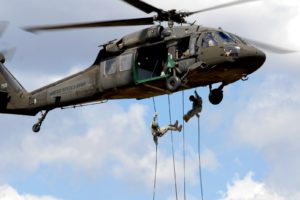By John M. de Castro, Ph.D.
“Sprinkling “Omm” mantras between “Ooh Rah!” battle cries can pay dividends for members of the Marine Corps and other branches of the military. According to a growing body of research, regular meditation improves the wellbeing of military members — both active duty and those who have previously served.” – Ella Xiong
Stress is an integral part of life. In fact, I’ve quipped that the definition of death is when stress ceases. People often think of stress as a bad thing. But, it is in fact essential to the health of the body. If the muscles are not stressed to some extent they deteriorate. As it turns out, this is also true for the brain. The same goes for our psychological health. If we don’t have any stress, we call it boredom. In fact, we invest time and resources in stressing ourselves, e.g ridding rollercoasters, sky diving, competing in sports, etc. We say we love a challenge, but, challenges are all stressful. So, we actually love to stress ourselves. In moderation, it is healthful and provides interest and fun to life.
If stress, is high or is prolonged, however, it can be problematic. It can damage our physical and mental health and even reduce our longevity, leading to premature deaths. So, it is important that we employ methods to either reduce or control high or prolonged stress or reduce our responses to it. Participation in the military can be highly stressful. Hence, this can be an excellent laboratory in which to test methods to reduce or control stress. Mindfulness practices have been found routinely to reduce the psychological and physiological responses to stress. So, it makes sense to test the effectiveness of mindfulness practices to reduce responsiveness to the high levels of stress that can be experienced in the military.
In today’s Research News article “Impact of Mindfulness Training on Physiological Measures of Stress and Objective Measures of Attention Control in a Military Helicopter Unit.” See:
or below or view the full text of the study at:
http://www.ncbi.nlm.nih.gov/pmc/articles/PMC4867781/
Meland and colleagues recruited military helicopter pilots who were undergoing high workload, high stressful preparations for deployment into a combat zone. They were randomly assigned to receive a 4-month Mindfulness Stress Reduction Program (MBSR) program or were assigned to a wait-list control group. Measurements were taken both prior to and after the training of salivary cortisol levels that are indicative of stress levels and of mindfulness, attention, mental demand, anxiety, depression expectancies of positive outcomes, sleep, and physical activity.
They found that the MBSR program resulted not surprisingly in increases in mindfulness, particularly the observing and describing facets of mindfulness. It also produced a reduction in the physiological responses to stress as evidenced by a significant decrease in salivary cortisol levels. In addition, mindfulness training resulted in significant reductions in mental demands produced in a stressful task, worry, and depression and longer sleep with better sleep quality than the wait-list control group.
These results extend our knowledge of the effectiveness of Mindfulness Stress Reduction Program (MBSR) to reduce the physical and psychological responses to stress into real world highly stressful situations. It appears to help the individuals to cope with the mental demands of challenging tasks. This may improve the health and well-being of the military helicopter pilots and increase their effectiveness in the highly demanding role of pilot. If it can be effective here it can be effective virtually anywhere.
So, it is clear that mindfulness training can reduce stress not only during everyday life but also during highly challenging tasks.
“Mindfulness helps the body optimize its response to stress by helping the body interpret stressful events as bodily sensations. The brain adds less emotional affect to experiences and this helps with stress recovery.” – Martin Paulus
CMCS – Center for Mindfulness and Contemplative Studies
This and other Contemplative Studies posts are also available on Google+ https://plus.google.com/106784388191201299496/posts
Study Summary
Meland, A., Ishimatsu, K., Pensgaard, A. M., Wagstaff, A., Fonne, V., Garde, A. H., & Harris, A. (2015). Impact of Mindfulness Training on Physiological Measures of Stress and Objective Measures of Attention Control in a Military Helicopter Unit. The International Journal of Aviation Psychology, 25(3-4), 191–208. http://doi.org/10.1080/10508414.2015.1162639
Abstract
Objective: This study sought to determine if mindfulness training (MT) has a measurable impact on stress and attentional control as measured by objective physiological and psychological means.
Background: Periods of persistent, intensive work demands are known to compromise recovery and attentional capacity. The effects of 4-month MT on salivary cortisol and performance on 2 computer-based cognitive tasks were tested on a military helicopter unit exposed to a prolonged period of high workload.
Methods: MT participants were compared to a wait list control group on levels of saliva cortisol and performance on a go–no go test and a test of stimulus-driven attentional capture. Participants also reported mental demands on the go–no go test, time of wakeup, sleep duration, quality of sleep, outcome expectancies, physical activity level, self-perceived mindfulness, and symptoms of depression and anxiety.
Results: The results from a mixed between–within analysis revealed that the MT participants compared to the control group had a larger pre to post increase in high- and low-cortisol slopes, and decrease in perceived mental demand imposed by the go–no go test.
Conclusion: MT alleviates some of the physiological stress response and the subjective mental demands of challenging tasks in a military helicopter unit during a period of high workload.
